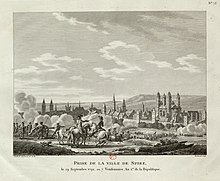Johann Adam White
Johann Adam Weiß (born May 9, 1751 in Speyer ; † February 15, 1804 there ) was a butcher, writer and the last imperial mayor of the city of Speyer.

Life
Weiss, born in 1751, came from a family of butchers that had already provided several mayors in Speyer. A first Johann Adam Weiß (1654–1731) was mayor in the even years from June 1722 to 1730 and senior master in the odd years from 1725 to 1731. Johann Michael Weiß was governing mayor from 1785 to 1791 and previously mayor since 1775 (both in the odd years).
The councilor and butcher is also considered a writer. After two tragedies in five acts in 1778 and 1779, he submitted two award papers . His work on meat taxes was accepted in 1788 by the Societät der Wissenschaften zu Göttingen , and another on guilds was awarded in 1792 by the Hamburg Society for the Promotion of the Arts and Useful Trades , although his theses were controversial in Hamburg .
With the religious name "Simias" he can be proven in September 1782 with the Illuminati .
Mayor and Maire
On September 30, 1792, ten days after the Valmy cannonade , Speyer was occupied by French revolutionary troops. With Carl Ludwig Petersen , the French set up the first provisional mayor in November . Like Petersen, Weiß became a member of the Jacobin Club . In the following years there were several short-term recaptures by the empire . During these months the old constitution was restored. During the third French "occupation", the council and mayor were mostly in Mannheim . After their return on January 6, 1796 Johann Adam Weiß took over the office of the governing mayor from Johannes Becker, who stepped down as senior master in the third member. Johann David Staub became mayor.
Four months later, the French came back for the fourth time for twenty days and in July for the fifth time. They named Johannes Becker mayor, on June 29th, Weiß und Staub became mayor again, and on July 4th, 1796, Weiß received the title of mayor for the first time. For the last time the imperial city constitution was restored for the month of October. Weiß, Staub and Becker were the last officials in their respective offices in the Free Imperial City of Speyer.
From October 31, 1796 until New Year's Day 1814, Speyer came under constant French rule. Johann Adam Weiß became mayor of the city for the second time. After the Peace of Campo Formio , Speyer officially belonged to the French Republic. After the last remnants of the imperial city constitution had been removed on January 1, 1798, municipalities were introduced in the canton of Speyer on January 23 . On February 8, Weiß had to resign his office to the municipal agent Carl Alexander Holtzmann . This was followed by Wilhelm Leschmann and Franz Freytag.
In the first elections on February 5, 1801, Johann Adam Weiß received the trust of his fellow citizens. On the same day he was again mayor of the city. He died three years later on February 15, 1804. His successors were Ludwig Wilhelm Sonntag and, in 1809, Georg Friedrich Hetzel for the last time.
Works and writings
Dramas
- Rose, the nun against her will. A tragedy in five acts. Munich 1778. Online
- Von Helm, the Freygeist a hypocrite. A tragedy in five acts. Löffler, Mannheim 1779. Online
- The return from hostage. A play in one elevator. 1792.
Fonts
- Answering the Preiß question: How can meat taxes in cities be determined most safely? Or by what dispositions can the cheapest price of meat be brought about? Enderes, Speyer 1788. Online
- About the guild system and the question, should the guilds be retained or abolished? One of the Hamburg Society for the Advancement of Arts and Useful Trades on Oct. 25th. Award script won in 1792. Brönner, Frankfurt am Main 1798. Online
Others
- Johann Adam Weiß Maire of Speier to his fellow citizens . Kranzbühler, Speyer 1800. Online
See also
literature
- [Wilhelm] Harster: Speierer mayor list from 1289 to 1889. In: Communications of the Historical Association of the Palatinate . Gilardone, Speyer 1889. pp. 78f.
Remarks
- ^ DNB : Weiss, Johann Adam . (accessed on January 14, 2019)
- ↑ Old master in the even years 1776–1792
- ^ Negotiations of the society about the advantages and disadvantages of the guilds and guilds and about improvement or complete abolition of them. In: Negotiations and writings of the Hamburg Society for the promotion of the arts and useful trades. Volume 3. Bohn, Hamburg 1795. pp. 168ff
- ^ Research platform of the Gotha Research Center: Johann Adam Weiß . (accessed on January 14, 2019)
| personal data | |
|---|---|
| SURNAME | White, Johann Adam |
| ALTERNATIVE NAMES | Know adam |
| BRIEF DESCRIPTION | Imperial mayor, mayor and author |
| DATE OF BIRTH | May 9, 1751 |
| PLACE OF BIRTH | Speyer |
| DATE OF DEATH | February 15, 1804 |
| Place of death | Speyer |